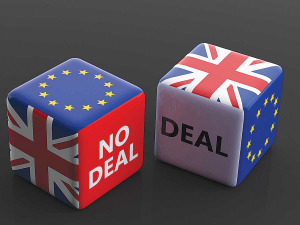Mission impossible
Agriculture and Trade Minister Damien O'Connor is off to Europe soon to try and breathe some life into free trade talks between NZ and the UK, and NZ and the European Union.
 Britain and the EU will try and hammer out a deal before the end of the year - where a no deal is more than possible.
Britain and the EU will try and hammer out a deal before the end of the year - where a no deal is more than possible.
A former Irish Prime Minister says even if the UK and EU manage to work out a deal over Brexit it will be very limited and cause a lot of disruption.
John Bruton, who is now the EU’s Ambassador to the USA, says under a deal or no deal, the extra time it will take for goods to clear customs between the UK and EU will lead to long lines of trucks queuing up at customs posts. He reckons the British people will quickly face major disruptions, higher prices for goods and an increase in the bureaucracy – all of which will annoy them.
Looking back on Britain’s involvement in the European Union, Bruton says the country saw itself as psychologically as being outside looking in, rather than actually being fully inside the union.
He believes this view was, to a degree, promoted by some sections of the British media and it was this scepticism of Europe that eventually led to the Brexit referendum and subsequently why the country decided to leave the EU.
“The basis of the argument for Britain leaving EU was that it would restore their sovereignty and they would become free again. But they never worked out in any great detail what they would do with their freedom and, to some extent, that is why they are now having difficulty negotiating the Brexit deal,” Bruton claims.
“They never worked out…the sort of relationship they would like to have with the European Union and that is the problem they still have today.”
Bruton says when the result of the Brexit referendum was known, no British politician wanted to appear in any way pro-European – they wanted a clean break.
He says the result is the fairly remote sort of trade agreement that is still being negotiated.
“They even talked about an Australian-type agreement, but without realising that Australia didn’t have an agreement with the EU, which could be code for no deal,” he says.
Bruton says one of his biggest worries about Britain leaving the EU is that this will lead to instability in the north of Ireland and that the 1998 Good Friday Peace Agreement will falter. He says there is a risk of instability in the north resulting from Brexit.
In the next days and weeks ahead, Britain and the EU will try and hammer out a deal before the end of the year – where a no deal is more than possible.
Bruton believes that secretly Boris Johnson may in fact want this. He says if there is a deal and it requires the support of the government, that could be a problem for Johnson to get everyone to agree.
Legal controls on the movement of fruits and vegetables are now in place in Auckland’s Mt Roskill suburb, says Biosecurity New Zealand Commissioner North Mike Inglis.
Arable growers worried that some weeds in their crops may have developed herbicide resistance can now get the suspected plants tested for free.
Fruit growers and exporters are worried following the discovery of a male Queensland fruit fly in Auckland this week.
Dairy prices have jumped in the overnight Global Dairy Trade (GDT) auction, breaking a five-month negative streak.
Alliance Group chief executive Willie Wiese is leaving the company after three years in the role.
A booklet produced in 2025 by the Rotoiti 15 trust, Department of Conservation and Scion – now part of the Bioeconomy Science Institute – aims to help people identify insect pests and diseases.